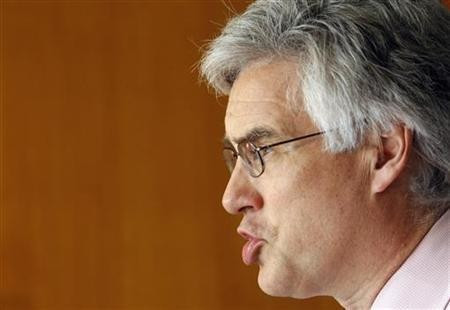FSA's Turner Calls for More 'Unconventional' Monetary Policy from Bank of England

Monetary policymakers must continue to think outside the box as they try to tackle the problems posed by the economic downturn, according to Lord Adair Turner, chairman of the Financial Services Authority (FSA) and a leading contender for the governorship of the Bank of England.
Continued recession at home and global economic turmoil has necessitated unorthodox monetary policies such as quantitative and credit easing from the UK's central bank, Turner said.
"The policy response has to include, and has included, unconventional monetary policies - quantitative easing - which as best we can tell has produced a path of real output growth and inflation slightly higher than would otherwise have occurred," Lord Turner told financiers in his final Mansion House speech before the FSA is wound down and a new regulatory system is put in place.
"But quantitative easing alone may be subject to declining marginal impact, the economy facing a liquidity trap in which replacing private sector holdings of bonds with private sector holdings of money has little impact on behaviour and thus on demand.
"So optimal policy also needs to include a willingness to employ still more innovative and unconventional policies, and to consider the combined impact of multiple policy levers - monetary policy, Bank of England liquidity insurance, prudential regulation and direct support to real economy lending - which we used either to consider quite separately, or else avoid entirely."
Britain's economy has not been able to recover since the financial crisis. It fell into recession for the second time in four years at the end of 2011 and has witnessed its longest double-dip decline since the Second World War.
International Monetary Fund (IMF) economists have downgraded their forecasts for the UK economy, slashing their predictions from 0.2 percent growth across 2012 to a -0.4 percent contraction.
At the heart of monetary policy has been the Bank's £375bn quantitative easing programme, called the asset purchase facility, which sees it buy up gilts in order to improve market liquidity.
The programme started with a target value of £200bn, but ever-worsening economic circumstances have led the figure to be increased three times, with the likelihood that an extra £50bn will be added in the coming months.
The Bank has also been backed by the Treasury in two new credit easing schemes to try and stimulate lending to the real economy of consumers and smaller firms.
A squeeze on affordable finance is perceived to be holding back the economy from growing, as businesses are unable to expand and create jobs while ordinary Britons cannot get a foot on the property ladder because of the high deposit requirements and rates demanded by home loan lenders.
Funding for Lending is the first scheme and sees banks offered cheap loans from the Bank in tandem with the value of their existing loan liabilities within the real economy.
As a bank increases its lending to this part of the economy, so does the total value of cheap cash it can access from the central bank.
When he was launching the scheme, Sir Mervyn King, Bank of England governor, said it should offer a "significant financial incentive" for banks to lend at affordable rates.
The second scheme is called Extended Collateral Term Repo (ECTR) and sees financial institutions able to borrow discounted rate cash in secured transactions with the Bank of England against low-quality assets.
This means banks can use poorer assets, such as consumer credit card debt, as collateral to borrow money at a significantly cheaper rate than they would in the inter-bank market. It is hoped this will then filter down into affordable lending for the real economy.
"This is an innovative combination of policies, and one which lies far outside past orthodoxy," said Lord Turner.
"And we need to be ready if these measures prove insufficient, to consider further policy innovations, and further integration of different aspects of policy - to overcome the powerful economic headwinds created by deleveraging across the developed world economies."
The IMF has even called for a further cut to the base rate from its record low of 0.5 percent.
Governor King is set to retire from his position in summer 2013. Lord Turner has applied for the role.
© Copyright IBTimes 2025. All rights reserved.






















